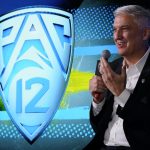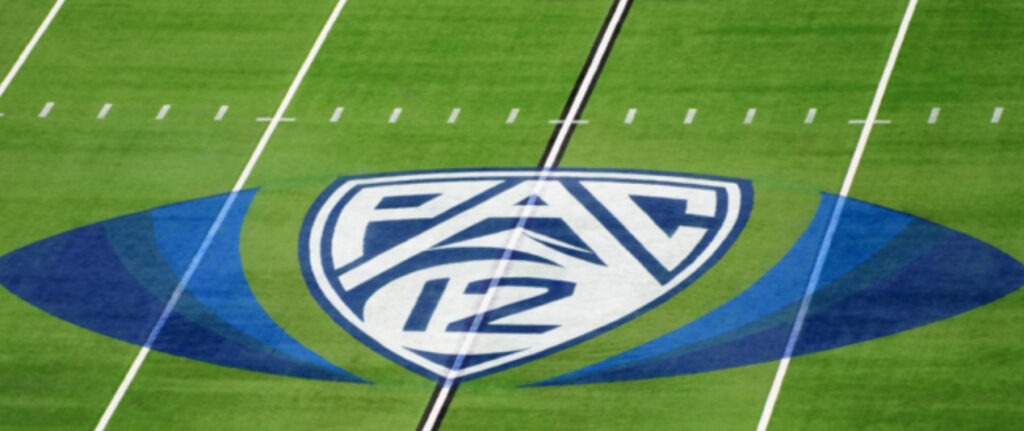One expert suggested the optimal outcome would be for the Big Ten to walk away with “big dollars and few partners.”
The announced departure of USC and UCLA on June 30 only strengthened that view. As it negotiates a media contract that will make or break the future of the 107-year-old conference, the Pac-12 needs soaring marketplace valuations and eager network partners.
Its strategic position seemingly improved this week with the news, first reported by the Sports Business Journal, that ESPN pulled out of the bidding for the Big Ten’s rights package in the contract cycle beginning next summer.
After four decades, ESPN is out of the Big Ten broadcasting business as Fox, NBC and CBS gobbled up the inventory at a combined price that’s expected to zoom past $1 billion annually.
Theoretically, the development is a victory for the Pac-12:
Its longtime partner, ESPN, could be incentivized to lock down the rights to Power Five football across the western third of the country and, especially, the valuable 7:30 p.m. Pacific Time kickoff window.
But the result falls short of an optimal situation for the Pac-12 for one reason: The remaining competition, or lack thereof.
“ESPN isn’t a charity,” an industry source said.
Ideally, the Big Ten negotiations would have left behind a second interested party.
With Fox, CBS and NBC sharing inventory that includes the New York, Chicago and Los Angeles media markets, the networks will have little, if any motivation to bid against ESPN for the Pac-12 rights.
Could Turner jump into the fray? Perhaps.
“They have given no buying signals,” the source said.
At this moment, we see no serious competition from linear television networks — and make no mistake: college football remains a linear-driven industry — that will drive up the price and force ESPN to pay tens of millions more annually than it intends.
However, that dynamic is somewhat offset by the chessboard.
Facts:
— The so-called fourth broadcast window (7:30 p.m. Pacific kickoff) moves the ratings needle and is a valuable property for ESPN.
It’s difficult to envision the network ending its college football coverage before prime time begins in the Pacific Time Zone, home to seven of the top 30 media markets in the country.
— The combination of big markets and limited competition has allowed the Pac-12 to generate more well-rated games (2.0 or better) than the Big 12 when the four outgoing schools (Texas, Oklahoma, USC and UCLA) are removed from the equation.
— The Pac-12 is the only Power 5 conference that can deliver weekly inventory for that late broadcast window — and it can deliver 26 times per season, if desired (every Friday and Saturday night for 13 weeks).
That’s almost 100 hours of college football programming, with little competition, in a prime time slot.
— The Big 12 is expected to begin media rights negotiations in the summer of 2024, for a contract cycle starting in the fall of 2025.
We mention the Big 12 piece because of the strategic calculation facing ESPN.
Even without serious competition from other linear networks, ESPN could be incentivized to offer a contract that helps keep the Pac-12 intact.
If the network comes with a lowball offer and the conference fractures, the most valuable remaining football programs likely would jump to the Big 12.
That leaves open the potential for Fox to go all-in with the Big 12 when negotiations begin in two years and effectively lock ESPN out of college football in the western half of the country.
At the very least, the fierce competition would drive the price far beyond what ESPN hopes to pay to share rights to a super-conference that directly competes (for broadcast windows) with its prized possession, the SEC.
(BYU is the only member of the reconfigured Big 12 not located in the Eastern and Central time zones.)
The most likely outcome, based on what we know today — and acknowledging the situation is highly fluid — is the following:
ESPN goes all-in with the Pac-12 at a satisfactory price point for the conference, thus locking up the competition-free windows in prime time across the Pacific Time Zone.
The agreement could come during the exclusive negotiating window, if that phase has been extended, or once the Pac-12 takes its rights to the open market.
The agreement could come in weeks or in months. It could include expansion, with new members taking reduced shares. It could include a load of games on ESPN+. But all signs point to a partnership.
Lastly, we can’t fully discount the potential for ESPN to eventually broker an alliance or merger of the Pac-12 and Big 12 as a strategic play to minimize Fox’s future access to the western half of the country. (The likelihood is extremely low, but non-zero.)
The Hotline has long believed the conferences are stronger together — we wrote as much three years ago.
In combined form, the 22-team (or more) conference would marginalize the ACC, provide ESPN with quadruple-headers and compete for multiple berths in a 12- or 16-team playoff.
If desired, the leagues could create a football-only alliance (or football- and basketball-only), allowing them to remain institutionally distinct and satisfying Pac-12 presidents concerned about academic, political, and cultural alignment.
However you slice it, however it ends, this much is clear: The developments in Big Ten country have moved the process forward in a (slightly) positive fashion for the Pac-12.
As a result, we have adjusted upward the conference’s existential crisis line. Survival is now a 4.5-point favorite over extinction — the most likely, but hardly certain, end game.
And now, after so much back and forth since June 30, the fourth quarter is about to begin.
Support the Hotline: Receive three months of unlimited access for just 99 cents. Yep, that’s 99 cents for 90 days, with the option to cancel anytime. Details are here, and thanks for your support.
*** Send suggestions, comments and tips (confidentiality guaranteed) to pac12hotline@bayareanewsgroup.com or call 408-920-5716
*** Follow me on Twitter: @WilnerHotline
*** Pac-12 Hotline is not endorsed or sponsored by the Pac-12 Conference, and the views expressed herein do not necessarily reflect the views of the Conference.
Related posts:

(AP Photo/Ralph Freso, File)
College Football Playoff expansion to begin in 2024 after Rose Bowl relents: Early start a boost for the Pac-12
(AP Photo/Marcio Jose Sanchez)
Pac-12 media rights negotiations: Waiting for UCLA, and welcoming Deion Sanders The Pac-12 top 10: Key storylines from a wild week of staff hires, player departures, AD tweets
The Pac-12 top 10: Key storylines from a wild week of staff hires, player departures, AD tweets

Clemson quarterback DJ Uiagalelei (AP Photo/Charles Rex Arbogast)
Pac-12 football: 2023 should be the Year of the QB as Oregon State adds an intriguing talentJon Wilner
Jon Wilner has been covering college sports for decades and is an AP top-25 football and basketball voter as well as a Heisman Trophy voter. He was named Beat Writer of the Year in 2013 by the Football Writers Association of America for his coverage of the Pac-12, won first place for feature writing in 2016 in the Associated Press Sports Editors writing contest and is a five-time APSE honoree.
